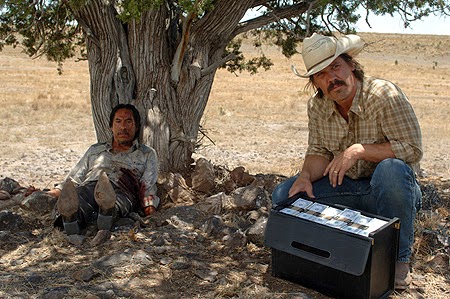I've discussed before some of the directors I admire. I love Kubrick and Lynch, but here I'm going to look at a pair of more recent directors. You may have heard of Joel and Ethan Coen, the directors of several great movies like The Hudsucker Proxy, Fargo, The Big Lebowski, O Brother, Where Art Thou?; No Country for Old Men, and True Grit. They've had their falling out now and then (I'll confess I didn't get much out of Burn After Reading) but they're still a great pair of directors of contemporary cinema.
So with all the great stuff the Coen Brothers have done, it is surprising what you can find when you look closely at their work. The thing is, while at first they may appear to have a widely diverse range of films, at their core, almost all of them follow more or less the exact same plot. The basic structure of a Coen brothers movie goes something like this: someone (exactly who varies, sometimes it's the main character, other times its an antagonist or supporting role) commits something that could be considered a crime. Usually it's something that seems simple in theory but when put into practice quickly spirals out of control and has a bunch of unforeseen consequences. Usually the characters get into a lot of trouble and end up way in over their heads as a result.
With Fargo, we have the botched kidnapping. Incompetent businessman Jerry Lundegaard devises an elaborate scheme to have his wife kidnapped and held for ransom so that he can use the money for his own ends. In theory this sounds simple enough, but things quickly get out of control and several people end up dead.
In The Hudsucker Proxy, the plot gets going by way of an elaborate scheme by a major corporation to let an idiot take over and then buy back all their stocks once they start to lose value. The trouble of course is that the "idiot" they hire turns out to be a lot smarter than they thought and actually manages to run the company fairly well.
In No Country For Old Men, the crime is Moss taking a satchel full of money from the scene of a drug deal gone wrong rather than turning it over to the police. In theory it should be simple enough, but he didn't count on a psychopath being sent after the money or there being a transponder in the satchel that could be used to track him down. Naturally, this seemingly simple act (and returning to the crime scene later) result in Moss being chased by the aforementioned psychopath, along with several people (including Moss himself) getting killed.
It is a bit harder to place exactly what the crime is in The Big Lebowski, since in this case the person in over his head is the Dude, who is more or less an outsider who gets caught up in several different actions. The most likely catalyst is the pseudo-kidnapping, which we eventually find out Jeffrey Lebowski had used as an excuse to take some money out of a joint account with his daughter and then hired the Dude expecting him to fail to deliver the money (which he was never given to begin with) as well as a scapegoat for the "kidnappers" to pursue.
The whole thing causes a massive amount of trouble for the Dude. On the other hand, the reason the Dude was there was because of the guys who peed on his rug mistaking him for Jeffrey Lebowski, as well as the fact that the Dude got caught up with Maude because he stole her rug. In that sense, it's actually several crimes coming together which all pile up on the Dude and send everyone after him.





No comments:
Post a Comment